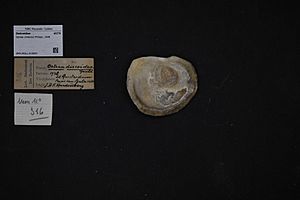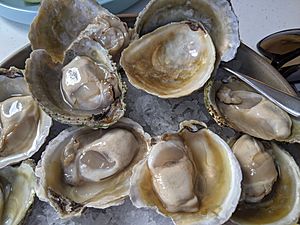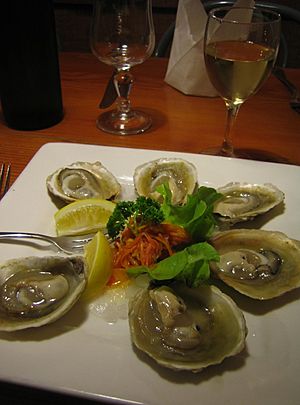Dredge oyster facts for kids
The dredge oyster or Bluff oyster is a special type of shellfish called Ostrea chilensis. In Chile, it's known as ostra chilena, or the Chilean oyster. This oyster is a bivalve mollusc, which means it's a sea creature with two shells, like a clam. It belongs to the family called Ostreidae, which includes many types of oysters.
Quick facts for kids Dredge oyster |
|
|---|---|
 |
|
| Museum specimen of the shell of Ostrea chilensis | |
| Scientific classification |
|
| Kingdom: | Animalia |
| Phylum: | Mollusca |
| Class: | Bivalvia |
| Order: | Ostreida |
| Family: | Ostreidae |
| Genus: | Ostrea |
| Species: |
O. chilensis
|
| Binomial name | |
| Ostrea chilensis Philippi, 1844
|
|
| Script error: The function "autoWithCaption" does not exist. | |
| Synonyms | |
|
|
Script error: No such module "Check for conflicting parameters".
Contents
Where Do They Live?
Native Homes
The dredge oyster naturally lives in the waters around Chile and New Zealand. These are its original homes.
Introduced Populations
Sometimes, animals are moved to new places by people. In the 1960s, some of these oysters were brought to the Menai Strait in Wales. Scientists wanted to see if they could be a new type of oyster for fishing.
However, the experiment didn't work out as planned. The oysters didn't reproduce well and were easily affected by diseases. Because of this, the experiment was stopped.
Invasive Species
Even though the experiment ended, the Ostrea chilensis oysters kept growing in the Menai Strait. They spread to other areas there. Now, they are considered an invasive species. An invasive species is an animal or plant that is not native to an area and can cause harm to the local environment.
What Do They Look Like?
The dredge oyster can grow quite large. Its shell can be up to 105 millimeters (about 4 inches) long. It can be up to 70 millimeters (about 2.7 inches) wide. The oyster itself can be up to 33 millimeters (about 1.3 inches) thick.
Where Do They Live in the Water?
You can find these oysters in shallow waters, even where the tide goes out. They also live in deeper parts of the ocean. They can be found as deep as 35 meters (about 115 feet) underwater.
Why Are They Important to People?
A Special Delicacy
In New Zealand, the dredge oyster is a very popular food. It's considered a special treat, or a "delicacy." People often call them "Bluff oysters" because of where they are caught.
These oysters are harvested from March to August. The main fishing area is the Foveaux Strait. This strait is near the town of Bluff, which is how the oysters got their local name.
Challenges for the Fishery
In the early 1980s, the number of oysters in the Foveaux Strait started to drop a lot. This was because of a tiny parasite called Bonamia exitiosa. This parasite caused a serious disease.
Between 2000 and 2003, this disease killed about a billion oysters. This was a huge problem for the oyster fishery.
Recovery Efforts
Since 2003, the oyster population has slowly been getting better. Fishermen have helped by choosing to catch fewer oysters than they are allowed. This helps the oyster numbers grow back.
 | Janet Taylor Pickett |
 | Synthia Saint James |
 | Howardena Pindell |
 | Faith Ringgold |



